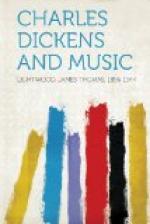How marvellously observant he was is manifest in the numerous references in his letters and works to the music he heard in the streets and squares of London and other places. Here is a description of Golden Square, London, W. (N.N.):
Two or three violins and a wind instrument from the Opera band reside within its precincts. Its boarding-houses are musical, and the notes of pianos and harps float in the evening time round the head of the mournful statue, the guardian genius of the little wilderness of shrubs, in the centre of the square.... Sounds of gruff voices practising vocal music invade the evening’s silence, and the fumes of choice tobacco scent the air. There, snuff and cigars and German pipes and flutes, and violins and violoncellos, divide the supremacy between them. It is the region of song and smoke. Street bands are on their mettle in Golden Square, and itinerant glee singers quaver involuntarily as they raise their voices within its boundaries.
We have another picture in the description of Dombey’s house, where—
the summer sun was never on the street but in the morning, about breakfast-time.... It was soon gone again, to return no more that day, and the bands of music and the straggling Punch’s shows going after it left it a prey to the most dismal of organs and white mice.
As a Singer
Most of the writers about Dickens, and especially his personal friends, bear testimony both to his vocal power and his love of songs and singing. As a small boy we read of him and his sister Fanny standing on a table singing songs, and acting them as they sang. One of his favourite recitations was Dr. Watts’ ‘The voice of the sluggard,’ which he used to give with great effect. The memory of these words lingered long in his mind, and both Captain Cuttle and Mr. Pecksniff quote them with excellent appropriateness.




